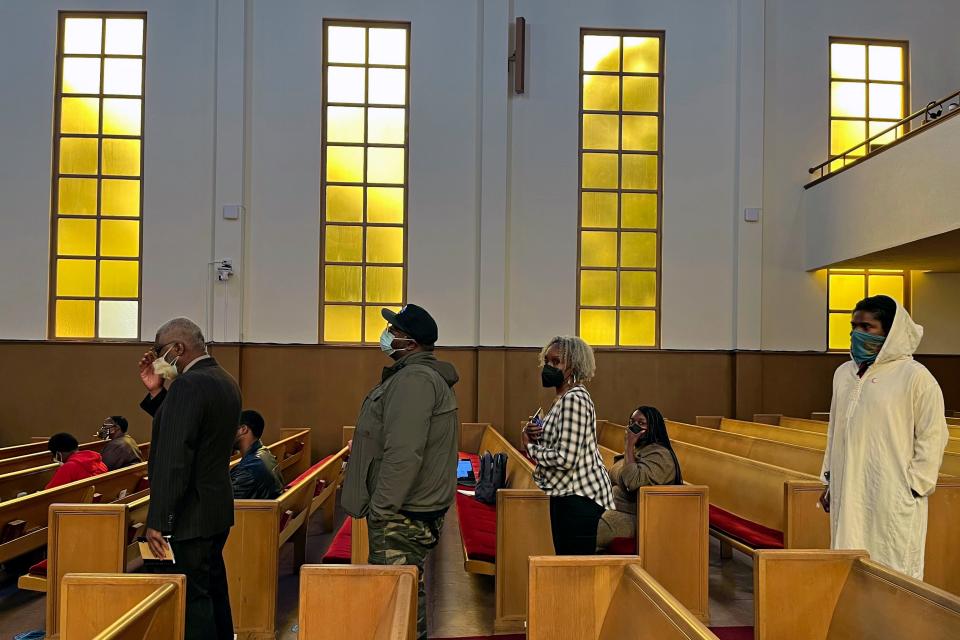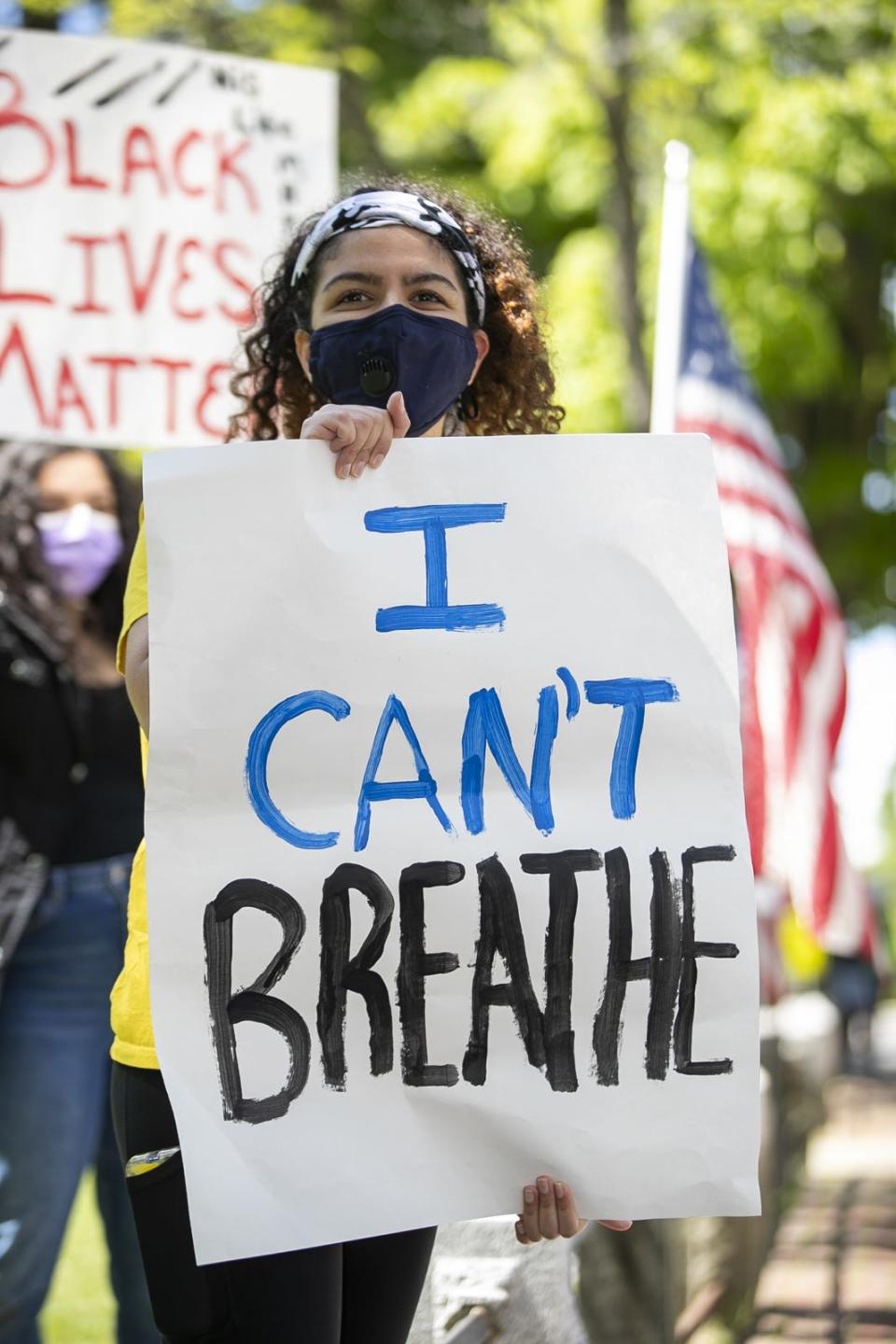Most Black people want reparations. They don't believe America will give them any
In 2020, Black people protested George Floyd's death and made their voices heard at the ballot box in record numbers.
More than a year later, they have grown more pessimistic about sweeping change across the United States but remain steadfast in demanding reparations and police reform, polling shows.
About 45% of Black people in the nation said equality is not likely to happen, according to a Pew Research Center survey released on Aug. 30.
Yet nearly 9 in 10 Black adults want to see aspects of the courts and other parts of the criminal justice system reformed, the survey said.
And 77% of Black adults said descendants of people enslaved in the nation should receive compensation, though most respondents think they will not see it in their lifetimes.
Kamilah Moore, a reparational justice scholar and chair of California's reparations task force, said the survey's findings show the need for change.
"Black pessimism is kind of ingrained in us," she said. "I think rightfully so because of what we've had to endure in this country. But then there's also, and always has to be, that critical mass of Black folks who are like, 'Yeah, we're retaining that pessimism, but we're still going to move accordingly. We're still going to fight for our rights.'"
The wide-reaching survey conducted in October 2021 serves as a snapshot of Black attitudes on race, even as many rallying cries for voting rights and rethinking the criminal justice system have not come to fruition since Floyd's death.
'HORRORS AND HARMS': California says slavery legacy requires 'comprehensive reparations'
Kiana Cox, a research associate at Pew, said the wide range of topics discussed in the survey is part of a long history of debate among Black people on redressing inequality. In the past, she said, discussions on the best pathway forward have included the integrationist pulls of Martin Luther King Jr. compared with the more nationalist ideas of Malcolm X.
"In every generation, in every era of Black history in the United States, there is this ongoing debate about what freedom looks like and how do we get there," said Cox.
Most Black people want reparations
Eighty-five percent of Black adults said slavery plays a role in the position of Black people in the nation, the survey said. Only 4% said slavery played no part in the current status of Black Americans. Black people in the Northeast were more likely to say the legacy of racism significantly impacts Black people compared to the South and the Midwest, the survey found.

The survey's findings come amid increased attention on reparations for the descendants of Black people enslaved in the nation. Recently, at the federal level, reparations advocates have pushed to pass H.R. 40, a bill first introduced in 1989 that would create a commission to study reparations.
Universities such as Brown in Rhode Island and Harvard in Massachusetts have instituted reparation plans to help address their roles in the enslavement of people of African descent.
Cities and states have also come up with reparation task forces or plans. California's reparations task force called for Black Americans to get reparations. The task force has meetings set for Sept. 23 and Sept. 24.
Asheville, North Carolina, has also approved reparations plans.
Many Black Americans have 'battle fatigue'
Black people were divided over how to advocate for change.
About 1 in 6 Black adults said Black voting is either "extremely" or "very effective" toward getting equality for Black people, the survey said. Black voters over the age of 65 and older were more likely to say voting is highly effective (77%), compared with Black adults between 18 and 29 (48%).
Nearly 1 in 4 Black people said ownership of every business in African American neighborhoods moves the needle toward racial equality, the survey said.
"Battle fatigue," is how Chris Lodgson described Black sentiment portrayed in the survey.
Hodgson, a lead organizer for Coalition for a Just and Equitable California — a group fighting for reparational justice, said Black people protested the deaths of Breonna Taylor and Floyd and intimately felt structural inequities.
'We went through a lot and nothing changed. Nothing changed for us," he said, adding that some Black people are "tired of fighting the illusion."
But when it comes to how reparations could be distributed, Lodgson said he wants Black people to think about the way wealth is gained.
"Wealth comes first then you get all that other stuff," he opined.
Of Black adults who support reparations, about 80% said it should come in the form of scholarships, while 77% said it should come in the form of financial assistance for starting or improving a business.
About 75% said funds should go to financial assistance for buying or remodeling a home, the survey said. And 69% said cash payments would be a beneficial form of reparations.
When asked who should pay for the benefits, respondents overwhelmingly said the federal government.

Moore, of California's reparations task force, said one state's reparations do not stop another form, noting that there are several components to reparations under international law. Other components of reparations can include restitution for stolen land or theft of intellectual property such as songs or inventions.
She said reparations also involve halting harm that is still being perpetrated.
Some Blacks want to defund or reform the police
The demand for a fairer, more equitable criminal justice system also remains strong among Black people.
Nearly 90% of Black adults said the criminal justice system needs widespread changes to be equitable for Americans of African descent. Roughly half of Black adults said the police, courts and judicial process should be completely rebuilt to ensure Black people are treated fairly.
Although many Black people want to see changes, the survey found a smaller share want police budgets slashed. Overall, about 40% want spending on police to stay the same. Meanwhile, 35% want to see it increase.
Of those who support decreased funding for police, they would like the money to be reallocated to social services, along with medical and mental health programs, the survey said.
Tiffany Cusaac-Smith covers race and history for USA TODAY. Click here for her latest stories. Follow her on Twitter @T_Cusaac.
This article originally appeared on USA TODAY: Black people want reparations, feel pessimistic after George Floyd

